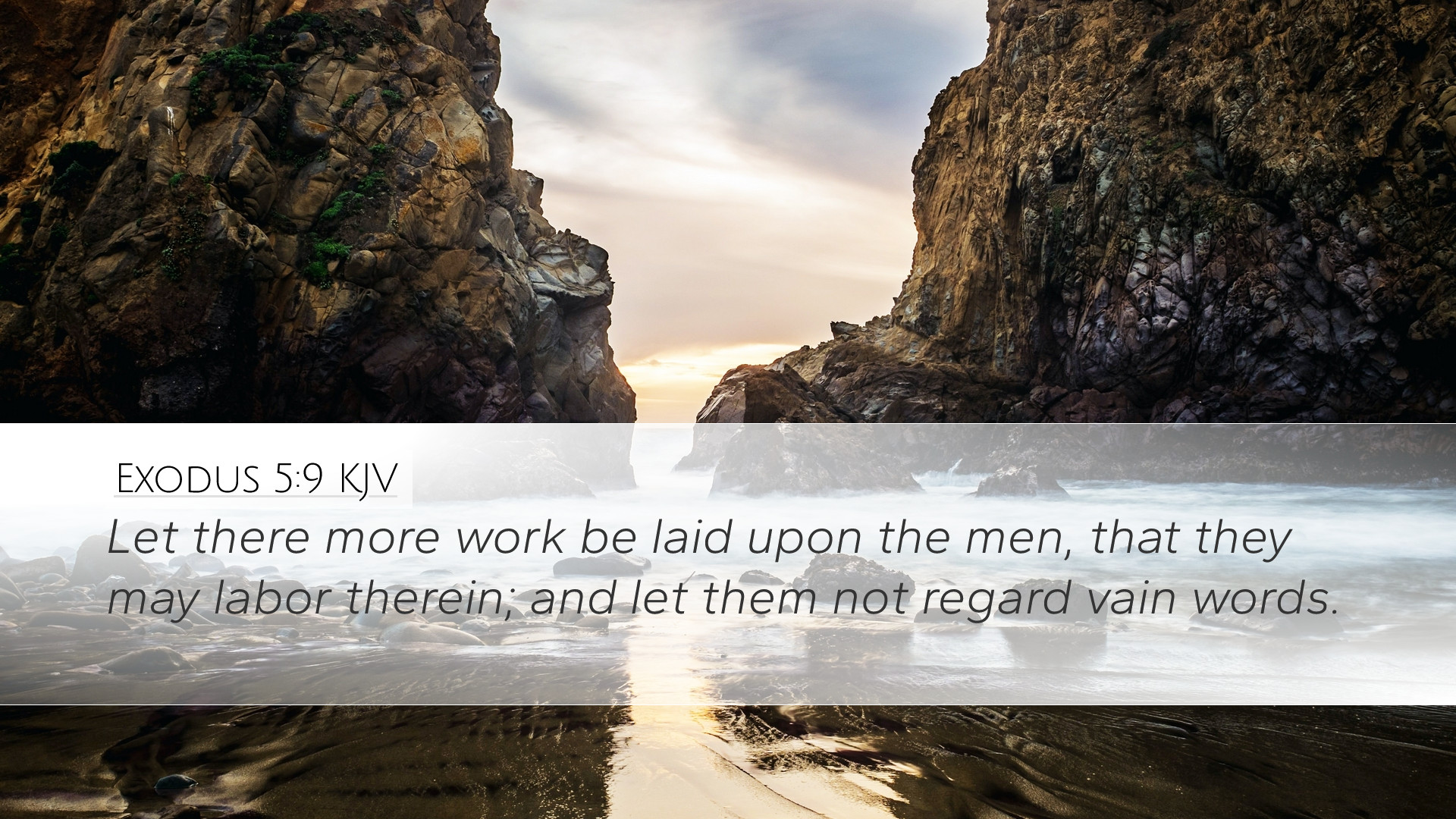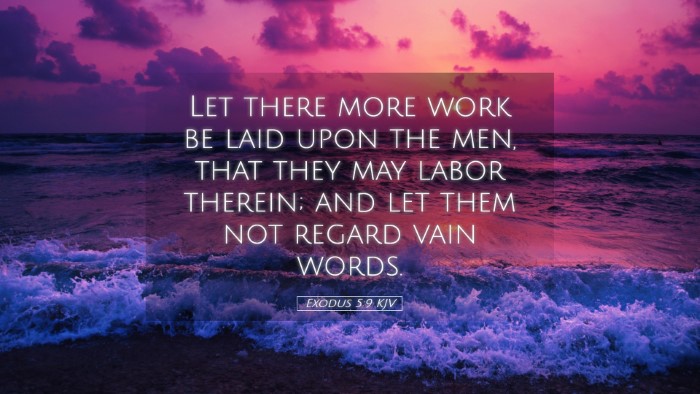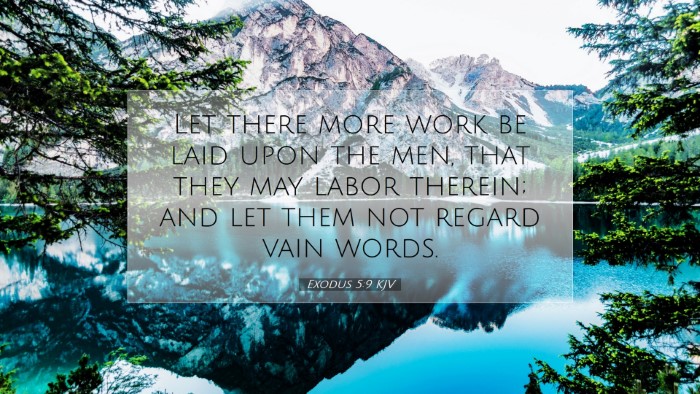Exodus 5:9 - Commentary Summary
Bible Verse (Exodus 5:9): "Let heavier work be laid upon the men, that they may labor therein; and let them not regard vain words."
Contextual Background
Exodus 5 stands at a critical juncture in the biblical narrative, where Moses and Aaron confront Pharaoh, demanding the release of the Israelites from slavery. The context of this verse reflects the intensifying oppression faced by the Israelites as Pharaoh seeks to reassert control over them following their request for freedom. This situation is pivotal not only for the liberation of the Israelites but also for the demonstration of God's power and authority over earthly rulers.
Commentary Insights
This section summarizes insights from Matthew Henry, Albert Barnes, and Adam Clarke, providing a comprehensive understanding of Exodus 5:9.
Matthew Henry's Commentary
Matthew Henry emphasizes the cruelty of Pharaoh's response to Moses and Aaron's appeal. He notes that the king's command to increase the workload on the Israelites was intended to discourage them from considering the message of liberation they had received from God. Henry reflects on the psychological manipulation at play, where increased labor serves to distract the Israelites from thoughts of freedom and hope. He articulates the broader theological implications, suggesting that suffering often precedes divine intervention and deliverance.
- Oppression as a Tool: Henry argues that Pharaoh’s burdens were designed to shatter the spirit of the oppressed and keep them enslaved mentally and physically.
- Divine Sovereignty: He points to God's sovereignty, implying that while oppression is a reality, it serves to fulfill God’s greater purposes.
- Preparation for Redemption: The increased burdens prepared the Israelites for the forthcoming redemption, teaching them reliance on God amidst hardship.
Albert Barnes' Commentary
Albert Barnes provides a more analytical approach, emphasizing the strategic nature of Pharaoh's actions. He suggests that by intensifying the Israelites' labor, Pharaoh aimed to crush their resolve and render Moses' words inconsequential in their eyes. Barnes discusses the implications of "vain words," highlighting their potential dual meanings—words perceived as empty or misleading by Pharaoh and the broader implications for faith and promise among the Israelites.
- Vain Words: Barnes notes that Pharaoh dismisses the concept of liberation as mere deceit, underestimating the faith the Israelites were beginning to exercise.
- Resistance to Change: He illustrates how oppressive regimes often resist change by burdening those who seek it, using labor to control populations.
- Theological Reflection: He reflects on the paradox of faith against the silence of oppression, urging believers to hold fast to God’s promises even when circumstances seem dire.
Adam Clarke's Commentary
Adam Clarke provides a pastoral reflection, highlighting the emotional and spiritual dimensions of the Israelites' struggle. He captures the sense of despair that arises from increased oppression while also pointing readers to the hope found in God's covenantal faithfulness. Clarke emphasizes the importance of understanding the historical and cultural context of the Israelites' plight, noting how their labor was both a physical and spiritual battleground.
- Historical Context: Clarke delves into the socio-political climate of Egypt, explaining how Pharaoh's command reflects the ancient practice of using forced labor as a means of control.
- Emotionality of Labor: He highlights the emotional toll that heavy labor inflicts, encouraging pastors and leaders to empathize with those who suffer under similar burdens today.
- Hope Amidst Despair: Finally, Clarke reassures that despite the dire circumstances, God’s plan is unfolding, and deliverance is on the horizon, fostering hope for both the ancient Israelites and modern believers facing oppression.
Theological Implications
The commentary on Exodus 5:9 presents several theological principles relevant for pastors, students, and theologians:
- The Reality of Suffering: Just as the Israelites endured hardships, believers today must recognize that suffering is part of the human experience and can serve a divine purpose.
- Faith in Adversity: The passage challenges recipients of God's promises to maintain their faith despite circumstances that suggest abandonment or failure.
- God's Sovereignty: This verse serves as a reminder of God's overarching authority, even when earthly powers seem overwhelming.
- The Call for Justice: The plight of the oppressed calls for social and spiritual activism, urging church leaders to advocate for justice in their communities.
Conclusion
The insights drawn from the commentaries of Matthew Henry, Albert Barnes, and Adam Clarke on Exodus 5:9 offer a rich tapestry of understanding regarding the nature of oppression, faith, and divine liberation. For pastors, theologians, and scholars, this passage illustrates the complexity of human suffering within the narrative of salvation, encouraging a robust reflection on the dynamics of faith under pressure and the unyielding promise of God’s deliverance.


